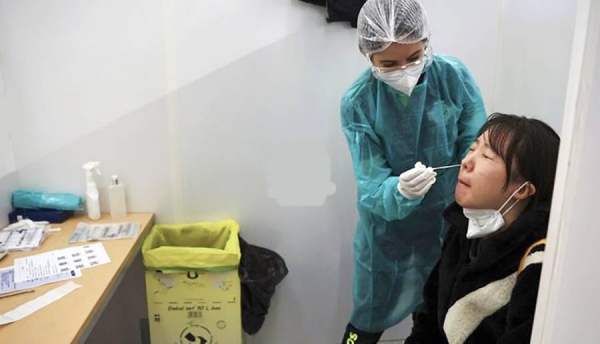
Vaccine doses crossing the border between the Republic and Northern Ireland will have to be recorded in Dublin but they will not be at risk of being blocked under an EU regulation in force to avoid shortages in the bloc.
The compromise struck between the European commission and Dublin followed an international outcry over Brussels’ initial plan to in effect erect a vaccine border on the island of Ireland, with exports requiring authorisation.
The revised regulation was brought into force on Saturday after a tumultuous 24 hours, during which the commission was accused of an “act of hostility” and enforcing a hard border with the Republic of Ireland by Northern Ireland’s first minister, Arlene Foster.
Brussels wants to ensure that pharmaceutical companies producing in the EU supply the member states with the doses committed to in their contracts. There had been a concern that Northern Ireland could be used as a backdoor for doses to move into the rest of the UK.
AstraZeneca’s announcement last week that it would only be able to deliver 25% of the planned 100m doses in the first quarter of this year raised suspicion that the vaccine had been distributed to the UK from Belgian and German plants.
But following calls from both Boris Johnson and Ireland’s taoiseach, Micheál Martin, on Friday night, the commission dropped a plan that could have led to exports across the island of Ireland being blocked.
On Saturday, following a call with the commission’s vice-president, Valdis Dombrovskis, the UK foreign secretary, Dominic Raab, tweeted: “Constructive conversation with [Valdis Dombrovskis] this afternoon.
“I was reassured the EU has no desire to block suppliers fulfilling contracts for vaccine distribution to the UK. The world is watching and it is only through international collaboration that we will beat this pandemic.”
Michael Gove also said the government expected coronavirus vaccines manufactured by Pfizer and AstraZeneca on the continent to be supplied to the UK without any disturbance.
Telling reporters the EU recognises it “made a mistake”, the Cabinet Office minister said: “We’ve entered into contractual arrangements with AstraZeneca and Pfizer and we expect those arrangements to be honoured.
“President Von der Leyen was clear that she understood exactly the UK Government’s position … Of course we will work with [the EU] in order to make sure that their own problems can be tackled.
“Our first priority is vaccinating people in the United Kingdom … We’re confident that we can proceed with our vaccine programmes exactly as planned.
“I’ve spoken to the European commission vice-president Maroš Šefčovič about this and we both agreed that we need a reset, that we need to put the people of Northern Ireland first.”
Under the new regulation, the Irish government will be required to report on the quantity of doses distributed to Northern Ireland, in a sign that the commission remains concerned that it could remain a backdoor route for the movement of vaccines to the rest of the UK.
An EU official said: “We have also got suspicions that certain vaccinations are leaving Europe instead of coming to us so we have put in place this mechanism to check.”
Officials on Saturday said they remained determined to hold the pharmaceutical companies to account, with vaccine shortages being reported across the block.
“We have a serious issue with a company that has signed a contract with us saying that it was to put at our disposal vaccines from two factories from the UK – and has not delivered a single dose from those factories,” an EU official said. “And it was clearly saying, supported by the British government, that those factories will not be delivering vaccines to the EU until the UK has got the 100m doses it is supposed to get. This is a serious issue for us.”
Ireland’s Europe minister, Thomas Byrne, said he hoped lessons had been learned within the commission.
“This type of provision is standard in trade agreements but in the Northern Ireland situation, it obviously has a different political resonance and it’s perhaps the case that this wasn’t fully appreciated by the drafters,” Byrne told Newstalk radio. “Clearly a mistake was made … It’s clear the implications of article 16 weren’t fully thought through, that’s a pity, but it’s a lesson to us all at this point.”
Asked if Martin had been given any forewarning of the planned triggering of the provision, Byrne said he was not. Article 16 was agreed in the original Brexit withdrawal agreement and gives both sides the power to unilaterally introduce checks on goods if not doing so could result in “serious economic, societal or environmental difficulties”.
On Saturday, Northern Ireland’s first minister, Arlene Foster, told BBC Radio 4’s Today programme that the original EU decision to trigger a clause in the Brexit withdrawal agreement to require export authorisations was “absolutely disgraceful”.
“There is great unrest and great tension within the community here in Northern Ireland so this protocol that was meant to bring about peace and harmony in Northern Ireland is doing quite the reverse,” she said.












